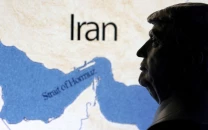High toll: Aid group fears 355 died in Syria nerve gas attack
Up to 3,600 Syrians showed ‘neurotoxic symptoms’; US weighs options for response.
Around 3,600 patients displaying ‘neurotoxic symptoms’ flooded into three Syrian hospitals on the day of alleged chemical weapons attacks, and 355 of them died, MSF said on Saturday. PHOTO: FILE
Doctors without Borders (MSF) suggested as many as 355 people may have been killed in the alleged chemical attack in Syria, as the US reviewed options for possible response to the incident.
Around 3,600 patients displaying ‘neurotoxic symptoms’ flooded into three Syrian hospitals on the day of alleged chemical weapons attacks, and 355 of them died, MSF said on Saturday.
The victims all arrived within less than three hours of each other, and MSF director of operations Bart Janssens said the pattern of events and the reported symptoms ‘strongly indicate mass exposure to a neurotoxic agent’.
“Medical staff working in these facilities provided detailed information to MSF doctors regarding large numbers of patients arriving with symptoms including convulsions, excess saliva, pinpoint pupils, blurred vision and respiratory distress,” he said.
Syrian opposition groups have accused President Bashar al Assad’s forces of launching massive chemical attacks near Damascus on August 21 and killing as many as 1,300 people. The Syrian government has strongly denied those allegations, but has yet to accede to demands that UN inspectors already in the country be allowed to visit the sites of the alleged attacks.
If confirmed, it would be the deadliest use of chemical agents since Saddam Hussein gassed Iranian troops and Kurdish rebel areas in northern Iraq in the 1980s.
MSF is the first independent source to report such a high toll from the alleged attacks.
“MSF can neither scientifically confirm the cause of these symptoms nor establish who is responsible for the attack,” said Janssens.
“However, the reported symptoms of the patients, in addition to the epidemiological pattern of the events strongly indicate mass exposure to a neurotoxic agent.”
Obama consults aides on Syria
US President Barack Obama met with security aides on Saturday to discuss a response to Syria’s alleged chemical attack.
“The president has directed the intelligence community to gather facts and evidence so that we can determine what occurred in Syria. Once we ascertain the facts, the president will make an informed decision about how to respond,” a White House official said.
Obama warned a year ago that the use of chemical weapons by Assad’s forces was a ‘red line’ that could bring about a more strident Western intervention. However, he has also voiced caution about the kind of intervention that could draw the United States into a quagmire.
US commanders have nevertheless prepared a range of options if Obama chooses to proceed with military strikes against Damascus, US Defence Secretary Chuck Hagel told reporters during a visit to Southeast Asia.
“The Defense Department has a responsibility to provide the president with options for all contingencies,” Hagel said. “And that requires positioning our forces, positioning our assets to be able to carry out different options – whatever the president might choose.”
Published in The Express Tribune, August 25th, 2013.



















COMMENTS
Comments are moderated and generally will be posted if they are on-topic and not abusive.
For more information, please see our Comments FAQ